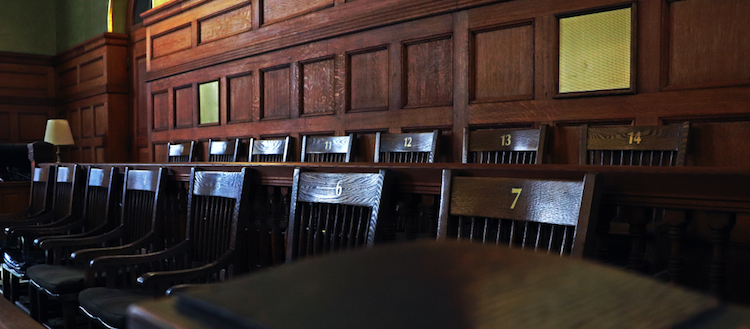Man convicted by jury that included judge's wife isn't entitled to new trial, top state court says

Image from Shutterstock.com.
The Colorado Supreme Court has affirmed the conviction of a man tried by a jury that included the judge’s wife.
In a June 1 opinion, the court said the defense lawyer for Gary Val Richardson didn’t object to the wife sitting as a juror, which waived any challenge on appeal. And the judge didn’t have a duty to excuse his wife as a juror or recuse himself from the trial, the court said.
The Colorado Sun and Colorado Politics identified the judge as Thomas Ensor of Adams County, Colorado, who is now retired. Richardson was on trial for allegedly firing one or two shots in the direction of police officers during a 2013 standoff.
Ensor had joked about his wife being on the jury during the trial. During jury selection, he told defense lawyers before jurors entered the courtroom to “be nice to Juror 25. My dinner is on the line.”
After the jury was sworn in and excused, Ensor told the lawyers that he had never heard of a sitting judge having a spouse or family member on the jury. “There’s nothing wrong with it,” he said. “I think she’ll be a fine juror. I have not spoken to her about this case.”
When Ensor asked, “Anything else?”, the defense lawyer replied, “I think we’re both afraid to challenge her.”
“That wasn’t a stupid idea,” Ensor replied. “Thank you. I appreciate it.”
Ensor made four more comments acknowledging Juror 25 during the trial. Twice he asked his wife about dinner plans. Another time, his wife indicated that she had a question. Ensor said no questions could be asked until both sides ask questions. After Juror 25 indicated that she understood, Ensor said, “I said no to my wife.”
A fourth time, the defense lawyer told jurors in closing arguments that the trial had taken them away from their family and spouses. “Not everyone has been taken away,” he added. Juror 25 then said she had spent more time with her husband than usual. Ensor responded, “You forced her to spend more time with me, which is worse.”
Jurors convicted Richardson on two counts of attempted second-degree assault, three counts of attempted third-degree assault, one count of violation of bail bond conditions, and one count of possession of a controlled substance. He was sentenced to 16 years in prison.
The Colorado Supreme Court said Ensor “could have handled this unusual situation in a more restrained manner,” but “his failure to do so did not create reversible error.”
Ensor did not have a duty to excuse his wife as a juror when no objection was raised, the court said, although trial judges do have the discretion to remove a juror for cause without a request by lawyers.
Nor was Ensor required to excuse himself as a judge sua sponte, the court said. Nothing in any statute or the Colorado Code of Judicial Conduct requires judges to disqualify themselves when they are related to a juror. And there was no contention that Ensor was biased.
The court also said it was unclear whether the defense lawyer’s failure to object was because he was “cowed” or because he was making a strategic choice.
At a pretrial hearing, Ensor forced an election that spurred prosecutors to abandon attempted murder charges. Ensor also dismissed two counts of attempted second-degree assault before the trial and dismissed three more counts during the trial.
Justice William Hood wrote the majority opinion.
Justice Richard Gabriel argued in a dissent that the situation created a structural error that required reversal of the conviction.
“The trial judge’s conduct ensured special status for his wife as a juror, likely undermined the independence of the jury, chilled the lawyers’ advocacy, created an obvious appearance of impropriety, and ultimately deprived Richardson of the fair trial that the United States and Colorado constitutions guarantee him,” Gabriel wrote.



